US Says Deepening Iran, Syria Ties Should Be Of Concern To The World
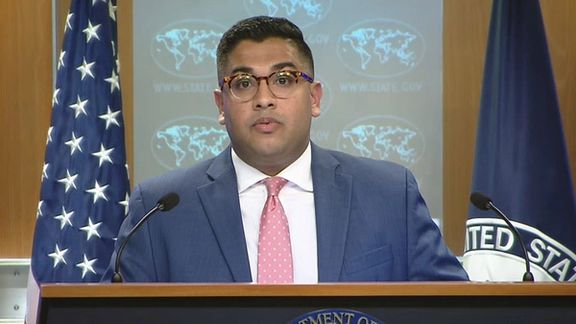
US State Department said Wednesday that closer ties between Iran and Syria should be of great concern, not just to US allies and the region, but to the world more broadly.

US State Department said Wednesday that closer ties between Iran and Syria should be of great concern, not just to US allies and the region, but to the world more broadly.
Department spokesperson, Vedant Patel, told reporters Washington has made clear to partners that it does not support others normalizing ties with Damascus.
Iranian President Ebrahim Raisi met his Syrian counterpart Bashar al-Assad in Damascus on Wednesday in the first visit by an Iranian head of state since Syria's war began in 2011, underlining close ties as Syrian relations with Arab states thaw.
Speaking to pro-Iran broadcaster al-Mayadeen on the eve of his visit, Raisi said the trip would "consolidate and develop" ties with Syria and other allies, including Lebanese armed group Hezbollah, which also intervened in Syria on Assad's behalf.
Raisi's visit comes as Iran and regional rival Saudi Arabia rebuild relations after years of tensions, and as Arab states that shunned Assad - including Riyadh - rebuild ties with his government.
Assad, speaking alongside Raisi, welcomed "the development" of ties between Tehran and Riyadh.
Raisi and Assad signed a long-term strategic cooperation agreement, including a memorandum of understanding on oil industry cooperation, the Syrian state news agency reported.
Raisi praised Syria for resisting what he described as U.S. pressure and confronting "takfiris", a term used to describe jihadists such as Islamic State. "Iran will always stand by Syria ... and supports its sovereignty," he said.
Raisi and Assad signed a long-term strategic cooperation agreement, including a memorandum of understanding on oil industry cooperation, the Syrian state news agency reported.
Reporting by Reuters
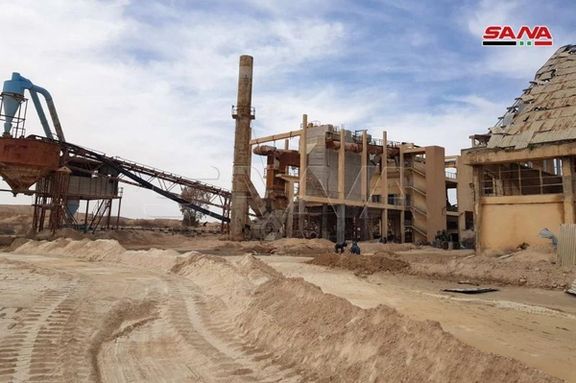
While President Ebrahim Raisi is in Syria, classified information obtained shows Tehran is procuring uranium from phosphate mines in Syria to make yellowcake.
According to the secret documents received by Iran International, the Atomic Energy Organization of Iran (AEOI) had asked the government to let the agency import 800,000 tons of phosphate from the mines under the Islamic Republic’s control in Syria without paying the share of the administration.
One of the documents is a letter issued in January by Mojtaba Hosseinipour, a deputy at the president’s office, addressing Minister of Economic and Financial Affairs Ehsan Khandozi and Reza Fatemi Amin, the former Minister of Industry, Mines and Business who was sacked this week, as well as former head of Iran's Planning and Budget Organization Masoud Mirkazemi and Mohammad Dehghan, Raisi’s deputy in legal matters.
In the letter, the office of the president has asked the officials to decide whether or not they can give the green light to the nuclear agency for “the annual purchase of phosphates from Syria without paying the government’s share.”
In 2017, Tehran and Damascus signed a memorandum of understanding to cooperate in a phosphate mine in Syria’s Al-Sharqiya. Syria is among the world’s largest exporters of the rock phosphate, a raw material used in the production of phosphatic fertilizers. The main use of phosphate is production of fertilizers, but the rock is also an unconventional source to extract uranium, explained in another document attached to the letter.
While EU sanctions on Syria do not explicitly prohibit phosphate imports, they do ban deals with the Syrian minister of oil and mineral resources, who is in charge of phosphates. Cheap Syrian phosphate exports to Europe have boomed in recent years, The Guardian reported in January 2022, noting that European farmers are dependent on phosphate fertilizers. Anyhow, it seems that the Islamic Republic has found another way around sanctions to advance its nuclear program.
Another letter included in the bundle of documents is by the head of Iran’s atomic agency, Mohammad Eslami, who asked Raisi’s first deputy Mohammad Mokhber to allow the purchase of the product from Syria.
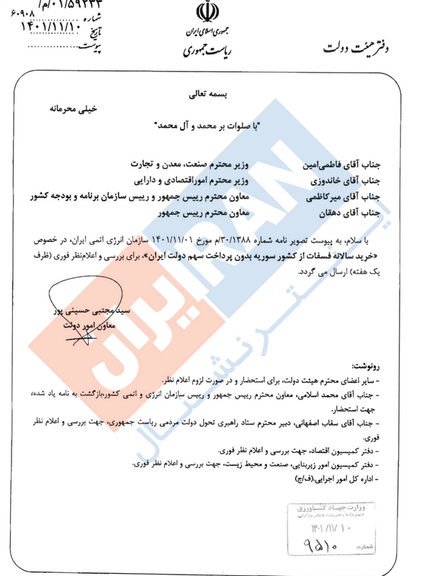
“In order to supply part of the uranium needed for the country's nuclear industry, this organization (AEOI) is mulling a project to extract uranium from Syria’s phosphate mines, the exploitation of which is at the disposal of the Islamic Republic,” Eslami wrote.
“Due to the high grade of uranium in the phosphate soil of these mines, the extraction of the element and the preparation of yellowcake from it is technically more feasible than the extraction of uranium from low-grade radioactive mines of Iran,” he added, requesting the cabinet to give the go-ahead for the project without paying the government.
Yellowcake is used in the preparation of uranium fuel for nuclear reactors, for which it is smelted into purified uranium dioxide for use in fuel rods for pressurized heavy-water reactors and other systems that use natural unenriched uranium. It has both civilian use as well as application for weapons but it should be processed further. Highly enriched uranium can be blended down with uranium containing low levels of U-235 to produce low-enriched uranium -- less than 5% U-235 -- fuel for power reactors. Further processing can yield weapons-grade uranium with U-235 levels usually above 90%, suitable for nuclear weapons.
In an appendix attached to the letter, the nuclear agency said that there are two main sources for extracting uranium, but the Islamic Republic is barred from using the conventional sources under international sanctions.
It has been forced to resort to unconventional sources in which uranium is extracted as a byproduct, such as is the case for phosphate soil.Khunayfis mine in Homs Governorate with 300 million tons of phosphates is the better choice among the mines under contract with Iran because it has a higher amount of uranium, according to the document.
The presidents of Iran and Syria on Wednesday signed a long-term strategic cooperation agreement, including a memorandum of understanding on oil industry cooperation.
The signing came during a visit by Raisi to Damascus for talks with his Syrian counterpart Bashar al-Assad, in the first such visit by an Iranian head of state since war broke out in Syria in 2011. Tehran is helping Syria rebuild its roads, airports, power stations and ports — potentially benefiting the Revolutionary Guards, which own the biggest construction firms in Iran.
In March, the E3, made up of France, Germany and the UK, issued a tough statement addressing IAEA Board of Governors, demanding immediate response to Iran’s 84-percent uranium enrichment.
While the US responded to the IAEA chief’s visit to Tehran with a cautious approach, waiting to see what the outcomes would be, the E3 said the enrichment at up to 83.7% U-235 is an “extremely grave escalation” which comes against the highly concerning backdrop of continued accumulation of high enriched uranium up to 60% and Iran continuing to expand its enrichment capabilities.
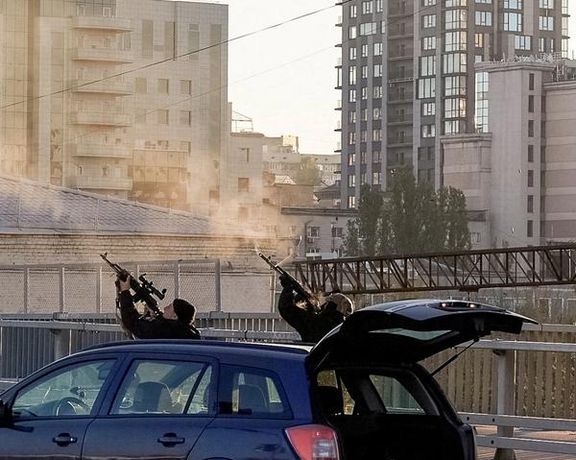
Russia launched 26 Iranian-made Shahed drones against Ukraine overnight Wednesday, but the Ukrainian air force said it downed 21 out of 26 suicide UAVs.
The drones were launched from Russian territory in the north and from the south on the eastern coast of the Azov Sea, Ukraine’s air force said.
Thirteen drones targeted Kyiv, but all were intercepted, the Kyiv City Military Administration said. Some wreckage fell on buildings and caused damage.
“Another massive drone attack on Kyiv,” Ukraine’s defense ministry tweeted. “It is obvious that the Russian military feels confident only when attacking peaceful cities.”
There is no reliable information where the five drones that evaded air defenses hit.
Russia has used hundreds of Iranian kamikaze drones since October to hit Ukrainian civilian infrastructure and to try to overwhelm air defenses during massive missile attacks.
The latest large-scale missile attack took place overnight on May 1, killing more than 30 civilians.
The United States and Europe have been supplying air defense weapons to Ukraine to prevent such Russian attacks and have sharply condemned Iranian supply of drones.
Iran first denied it had sent the weapons to Russia but in November Foreign Minister Hossein Amir-Abdollahian claimed the drones were shipped before the Russian invasion.
Ukraine has become more successful in shooting down the relatively slow flying Iranian drones. On December 5, the military said it had downed 60 of 70 Shahed drones, but it has been requesting more Western air defense systems.

Imprisoned human rights activist Narges Mohammadi accused the Islamic Republic of involvement in the poisoning of female students in Iran.
In a message after winning the UNESCO Prize for Freedom of the Press, Mohammadi said: "The regime pursues a policy that prevents girls from going to school by creating terror."
She further compared the Islamic Republic with the Taliban, stating that the Afghan militants "overtly" seek to deprive girls of the right to education, but the Islamic Republic pursues it "deceitfully".
The serial poisoning of students has been ongoing for over four months. The perpetrators have not been identified, while the attacks have spread to more and more cities.
Elsewhere in her remarks, Mohammadi urged foreign states to do more to topple the regime and liberate Iranian society.
"In adopting your policies, consider supporting civil society, the ones who take to the streets, and the political prisoners who are at risk of being executed. To advance the peaceful goals of the Iranian people, weaken the power of the regime to suppress, imprison, torture, and execute," she added.
UNESCO announced on Tuesday that Narges Mohammadi, Nilofar Hamedi and Elahe Mohammadi, three female journalists imprisoned in Iran, are the winners of this year's World Press Freedom Prize of this organization known as Guillermo Cano.
Founded in 1997, the Guillermo award is given each year to individuals or institutions that have contributed to press freedom in dangerous environments.
Earlier this year, the Swedish Olof Palme Foundation awarded its 2023 prize to three female activists, including Iran’s Narges Mohammadi, for their efforts in the fight for women's freedom.
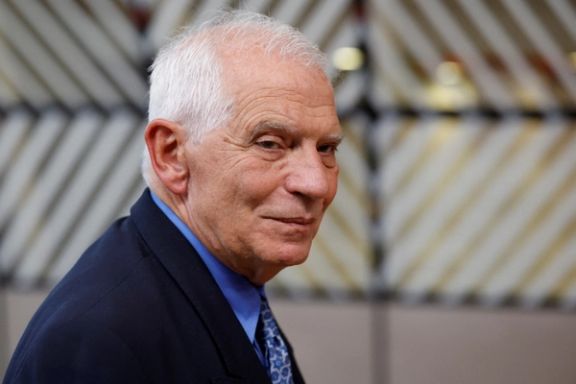
The European Union has slammed recent rocket and terrorist attacks against Israel, reiterating the country’s right to defend itself.
However, the EU’s Foreign Policy Chief, Josep Borrell, stressed that “any response must be proportionate and in line with international law”.
As Israeli Prime Minister Benjamin Netanyahu's government seeks to improve ties with the European body, Foreign Minister Eli Cohen met with Borrell in Brussels on Tuesday.
The EU’s Spanish diplomat urged Israel to refrain from “measures that could heighten the already high level of tension and jeopardize the very possibility of a future just and sustainable peace based on the two-state solution.”
During his visit, Cohen also discussed Iranian attempts to target Jews and Israelis on European soil with EU Parliament President Roberta Metsola.
According to the Times of Israel, they discussed the importance of the EU listing the Iranian Revolutionary Guard Corps as a terrorist group and banning all business with it.
In January, the European Parliament called on the 27-state body to list the Revolutionary Guards as a terrorist entity, blaming it for the repression of domestic protests and the supply of drones to Russia.
However, Borrell claimed the EU cannot list Iran's IRGC as a terrorist entity until a European court has determined that they are.
“European countries understand today more than ever the danger from Iran, and see eye-to-eye with Israel regarding the need to confront terror that comes from and is funded by the Iranian regime,” Cohen stated after the meeting with Metsola.
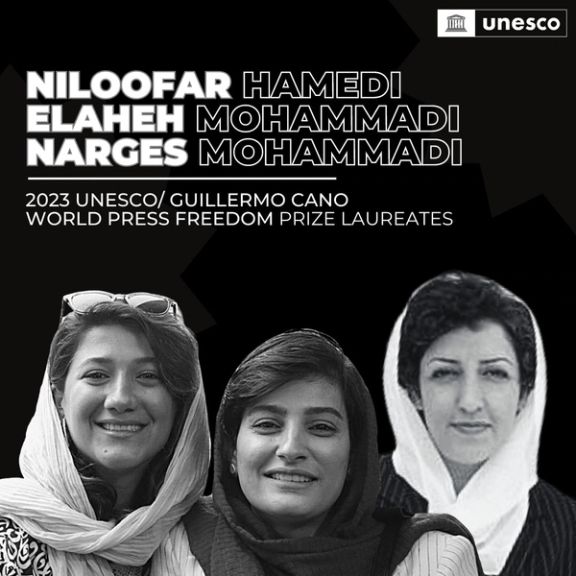
Three Iranian journalists currently behind bars have received the UN's most prestigious award for freedom of expression.
All three of them women and famous voices of Iran, have been awarded The 2023 UNESCO/Guillermo Cano World Press Freedom Prize.
Niloofar Hamedi, Elaheh Mohammadi, and Narges Mohammadi have become tools of the regime to suppress voices of dissent at a time when female journalists are increasingly under threat in Iran. It is believed around 70 journalists are currently behind bars, that number rocketing since the protests began in September.
Elaheh Mohammadi wrote about Mahsa Amini's funeral, and Hamedi broke the news that Amini died in morality police custody last September. Narges Mohammadi is renowned for her activism.
Amini’s death sparked months of protests in dozens of Iranian cities. This was one of the most significant threats to the Islamic Republic since the 2009 Green Movement rallies that drew millions of people to the streets.
“Now more than ever, it is important to pay tribute to all women journalists who are prevented from doing their jobs and who face threats and attacks on their personal safety,” said Audrey Azoulay, the UNESCO Director-General, on Tuesday during a ceremony in New York.
Zainab Salbi, the Jury Chair also said UNESCO is “committed to honoring the brave work of Iranian female journalists whose reporting led to a historical women-led revolution”.
The UNESCO/Guillermo Cano World Press Freedom Prize was established in 1997. Named after Colombian journalist Guillermo Cano Isaza, assassinated in front of his newspaper, El Espectador, in Bogotá, in 1986, it is given annually to individuals, organizations, or institutions that have made an outstanding contribution to press freedom in dangerous environments.